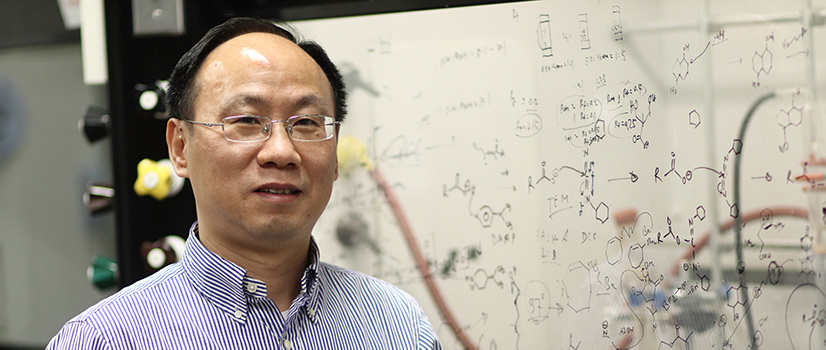This spring, Chuanbing Tang joined the nation’s top tier of biomedical engineers.
He was elected a member of the American Institute for Medical and Biological Engineering College of Fellows, an honor reserved for the top two percent of scientists who work in the field. Tang is the first chemistry professor at the University of South Carolina to earn the honor.
Tang stands out for his research with synthetic materials that can fight bacteria. As microbes evolve to resist antibiotics — sometimes making drugs ineffective or obsolete within a few years after the drugs are developed — Tang’s research uses polymers to fight bacteria more effectively.
“I found this area interesting because the problem is big, and the impact is big," Tang says. “I can develop another therapeutic approach that can contribute to extending the lifetime of antibiotics.”
His research is focused on using polymers to fight bacterial infections in animals, but he hopes to see his work in action in a clinical trial someday.
Impact close to home
While his professional colleagues laud him for his polymer research, much closer to home he is known for creating opportunities for the next generation of scientists. He runs South Carolina’s only Project SEED program, an American Chemical Society program that provides summer research fellowships to teenagers from low-income families. It allows students to earn money and gain experience that will help them in college.
“Shortly after I joined UofSC in 2009, I met a professor from New Jersey who introduced me to Project SEED,” Tang says. “I was so amazed by this program. He said, ‘There's not a single one in South Carolina. Can you do that?”
Tang instantly wanted to bring the program to S.C. He recognized it as something that would have aided him when he was a teenager in China. Thinking back to the teachers who inspired him, he saw Project SEED as a way he could inspire others.
“For a long time, I’ve thought scientists should be involved in community development,” Tang says.
He has run Project SEED for 10 years, although COVID-19 disrupted the program for the past two years. Tang says he often brags about the fact that all 40 students who have been through his Project SEED program have gone on to college.
“Many of them are the first generation of college students in their family,” he says.
Several of those students have come to UofSC. Tang says that most of his Project SEED alumni major in science or engineering, but some have studied business or other fields. Regardless of what their major, though, students point back to Project SEED, and Tang, for helping them jumpstart their college career. In addition to practice with hands-on science, students get a glimpse of university life.
Aujaunae' Brown, a psychology major at UofSC, says that two summers in Project Seed provided a solid foundation in preparing for college. Although Brown did not work directly with Tang, they did occasionally talk.
“He always spoke to me with respect and understanding and due to that, I always felt like a scientist speaking to another scientist," Brown says. “During my time in Project SEED, I was able to see just how passionate Dr. Tang is about the field of science, and how much he wanted to share that passion with future scientists.”
Tang also gave Brown the chance to meet psychology faculty and learn about other angles of research.
Environmental science major Samuel Hankinson, another two-summer Project SEED alumnus, said Tang's commitment was obvious and universal to all the students.
“All the time I worked there, he was constantly overseeing the research and always available, even to a high school student," Hankinson says. “He was dedicated to helping students in this field and even beyond this field. It was amazing to see his dedication and see how he was willing to give his time and support.”
A distinguished honor
Tang says his election to the AIMBE College of Fellows recognizes his team’s efforts, too.
“It was surreal,” he said of learning about his election. “This is really an award for my entire group’s effort over the last 10 years.”
According to a press release from AIMBE, the College of Fellows includes “the most accomplished and distinguished engineering and medical school chairs, research directors, professors, innovators, and successful entrepreneurs. … AIMBE Fellows have been awarded the Nobel Prize, the Presidential Medal of Science and the Presidential Medal of Technology and Innovation and many also are members of the National Academy of Engineering, National Academy of Medicine, and the National Academy of Sciences.”
Esmaiel Jabbari, a chemical engineering professor in the College of Engineering and Computing, was elected to the College of Fellows in 2013.
